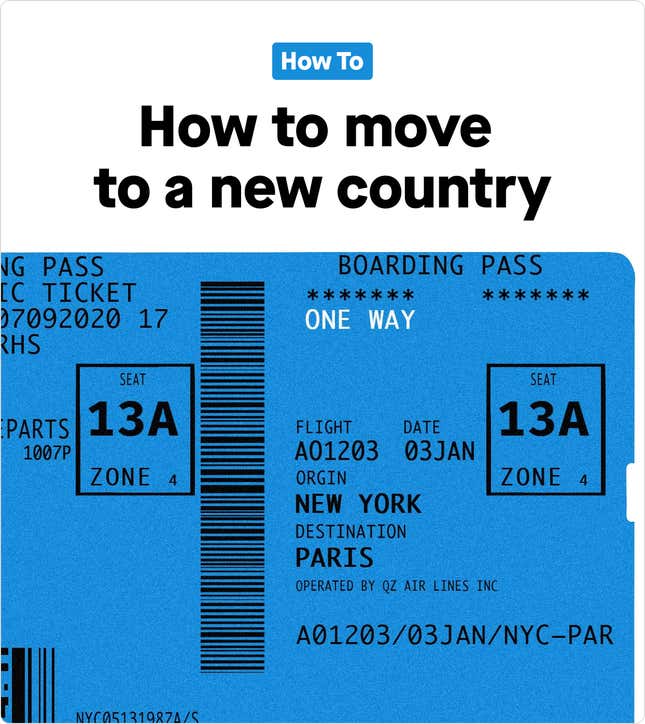
Moving to a country other than the one in which you were born can be one of life’s most enriching and rewarding experiences, and can expand your horizons in a way no week-long vacation ever will. But it’s also full of challenges and annoyances, from the petty to the potentially perilous.
I have a small bit of experience to speak from—I was born and spent most of my life in the US, but lived in several countries in sub-Saharan Africa for two years as a Fulbright fellow and freelance journalist, and now live in Cairo. I wouldn’t trade my time abroad for anything. It’s made me a better journalist and person, connected me to a global network of friends and colleagues, and (usually) been a hell of a lot of fun. Living abroad isn’t for everyone, and of course, each person’s experience will vary widely depending on where you go, what passport you carry, and many other factors. But if your life circumstances permit, and you’re willing to do a bit of homework, the strange and brave new world of remote working is the perfect time to give it a try.
Here are a few pointers on how to get rolling once you’ve decided to make the big move.
In the months before you go
📝 Do your homework. Don’t expect that a US or European passport means you can show up anywhere unannounced and do whatever you want. When it comes to immigration bureaucracy, “you have to be patient and creative and flexible,” said Neha Wadekar, an American freelance journalist based in Nairobi. Give yourself plenty (as in, months) of lead time to research some of the logistical elements needed for your move, such as:
- Long-term visa qualifications. During the pandemic, many embassies and foreign ministries are processing paperwork at a glacial pace. And while a handful of island and European nations have relaxed their residency requirements in a bid to attract digital nomad expats, most countries don’t allow visitors to stay on a tourist visa for more than a few months at most. Staying longer often requires sponsorship from an employer.
- Pet paperwork. If you have pets, make sure to research what sorts of vaccinations and veterinary paperwork will be required to import them (and double-check that they can be re-imported home in case your plans change).
In the weeks before you go
💸 Prep your finances. Dealing with taxes, banking, and insurance are among the biggest headaches of living abroad. Once you spend a significant amount of time abroad and meet various other qualifications, you may be able to secure income tax exemptions in your country of origin. But you’ll still need to file a tax return at home no matter what. And any overseas bank accounts, companies, or investments you control must be reported. Many people overseas inadvertently find themselves facing exorbitant fees and penalties, or having investment gains wiped out, because they fail to plan their taxes adequately, said Virginia La Torre Jeker, an expat tax advisor based in Dubai. Independent contractors and business owners especially, and anyone who marries a citizen of a different country, should proceed with great care and consult with a professional before filing.
If you plan to use credit or debit cards linked to an account at home, make sure you subscribe to ones with good points and no foreign transaction fees. You will also need to look into international healthcare coverage (as grim as it sounds, consider coverage for “repatriation of remains” in case the worst happens). And I strongly advise appointing a friend or relative at home as your “secretary”—someone whose phone number and mailing address you can use to receive important communications that may not be able to reach you abroad.
💊 Plan ahead for medications and other special needs. Don’t assume that any medication, or any resource you rely on for your health or wellbeing, will necessarily be available abroad. Get in touch with a doctor in your new country (each country’s US embassy website typically maintains a list of recommended specialists), and if anything you need is not available, stock up in advance or ask your doctor at home about alternatives.
Once you arrive
🚨 Watch and learn. Safety should always come first, and the best way to know what’s safe is to follow the lead of locals. If a certain street tends to be deserted at night, don’t walk on it! Pay attention to what locals consider to be appropriate dress in public, and follow suit even if you find it grating. Never leave home without a clear idea of where “home” is—an address or local landmark, something you can say to a taxi driver—and enough hard cash in your pocket to get you back there. If you meet a trustworthy taxi or Uber driver, save their number. Make a document with the contact information for your local embassy, a hospital, and emergency contacts locally and at home, print one for yourself, and share it with your employer, friends, and family. Never take unnecessary risks just to save a few bucks, and always follow local laws.
Ultimately, most cities around the world are the same: If you use common sense and maintain awareness of your surroundings, you can easily avoid most dangers. But in a new place, you won’t have the same support network in case something bad does happen. Don’t take it for granted that in an emergency you will know what to do. Plan, and adjust your tolerance for risk, accordingly.
🤝 Going out is better than staying in. With that said, give yourself an extra push to get out of the house. Making friends in a foreign country is never easy—it’s common for locals and expats to form separate social circles either because of disparities in economic background or because locals get tired of making and losing friends on the expat merry-go-round. So say “yes” to invitations, take peoples’ phone numbers the first time you meet them, and don’t be embarrassed to ask relative strangers for advice or to hang out. Join shared-interest groups on Whatsapp or social media. It takes time (months or years!) to build a community from scratch, and it’s extremely common and natural to feel lonely, alienated, or depressed in the meantime. But it’s well worth the extra effort to break out of the expat bubble and make friends with locals. “If you can get the courage to go out for one night,” Wadekar says, “then you’ll meet 10 people, who’ll introduce you to 10 people, etc.”
🤓 Become a student of your new place. Make a concerted effort to educate yourself about your new home. Invest your time and money in sustained, high-quality language classes. Read history books and novels, listen to the local music, learn to cook the local food. Buy a guidebook, make a bucket list, and travel widely around the country. The best way to fight culture shock is by proactively turning the unknown into the familiar.
Keep learning
- An eye for moving abroad? Bye-bye USA, hello tax complications! (Bloomberg)
- How Living Abroad Helps You Develop a Clearer Sense of Self (Harvard Business Review)
- Notes on a Foreign Country: An American Abroad in a Post-American World (book by Suzy Hansen)
- The top 10 countries for expats (Quartz)
- Amazon’s shows about Hong Kong expats couldn’t come at a worse time (Quartz)
Have a great weekend,
—Tim McDonnell, climate and energy reporter (and exemplar expat)
One ⚖️ Thing
Economic opportunities and the desire to experience a new culture were the top reasons residents of the US and other rich countries wanted to move abroad, according to an unscientific survey by the moving company Seven Seas.
But most people who move abroad don’t do so by choice; 26.4 million people were forcibly displaced outside their country in 2020, according to the UN. And many people who want to move are unable to because of financial or visa-related constraints.
